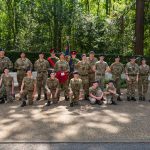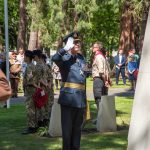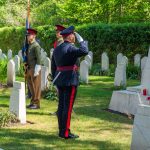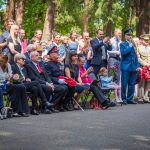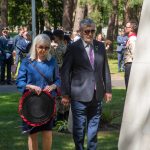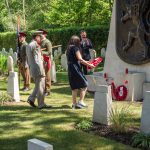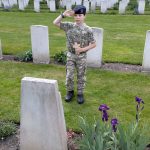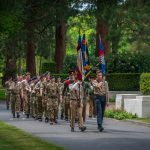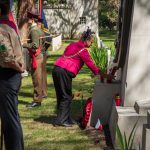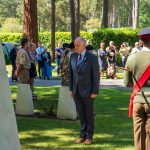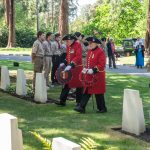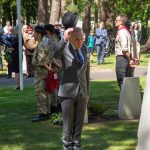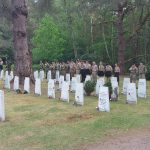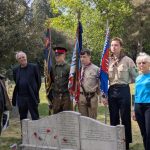I thought that I would share my speech from the VE Day 80th Anniversary event at Brookwood last weekend. I hope it makes you feel as super proud of our veterans and all they fought for, as the MAFCSV does.
The photos I have attached today are thanks to the Frimley and Camberley Army and Cadet Corps. 

We will continue to share pictures over the week and thank you to everyone who forwards them to us. It really is appreciated.
Eighty years ago, the guns fell silent across Europe. The war that had torn continents apart was finally over. But the peace we celebrate today was not won by nations alone — it was secured by individuals. Among them were the brave Czechoslovak men and women who fought alongside Britain and her allies, carrying with them unshakable courage, hope, and a longing for freedom.
This past week, we’ve remembered and celebrated the anniversary of VE Day. Watching archive footage from the streets of London and cities across the UK, it’s impossible not to feel the pure relief and joy on the faces of those who heard the long-awaited words: “The war in Europe is over.”
No more blackouts. No more curfews. No more waiting in fear for the next siren or bomb.
While researching this speech, I discovered that my own grandmother had been in Piccadilly Circus that very day, among the thousands celebrating. It was a moment of unity and sheer emotion — a breath of life after years of fear.
Across the UK, communities came together for street parties. They hung bunting, pooled rations, and made whatever treats they could — jam, Spam, paste, Marmite sandwiches, gingerbread, rock buns, and, if they were lucky, jelly and custard made with egg substitute. It may sound simple now, but after years of scarcity, these gatherings were magical. That night, bonfires were lit, and searchlights lit up the skies not to find enemy planes — but to mark peace.
I know that many of you here today have your own family stories — where your relative was on VE Day, what they felt, what they saw. I encourage you to share those memories — with each other, and especially with the young people here today: the students, the cadets, the Czech Skauts. Because remembrance is not just about the past — it is about passing on truth, honour, and gratitude to future generations.
In France, on May 8th and 9th, 1945, the Czechoslovak Independent Armoured Brigade Group, under General Alois Liška, was positioned around Dunkirk, coordinating the surrender of German forces led by Vice Admiral Frisius. Earlier that month, a small group of Czechoslovak soldiers had joined the U.S. 16th Armoured Division, part of General Patton’s Third Army, hoping to reach Prague in time for its liberation. But due to the Yalta Agreement, Prague had to be “liberated” by Soviet forces, and so the Czechoslovak troops stopped in Pilsen, which they had helped liberate on May 6th.
Meanwhile, in the UK, our RAF squadrons were still on duty:
• 310 Squadron, based in East Anglia, flew reconnaissance missions along the Dutch and Belgian coasts.
• 311 Squadron, from RAF Tain, patrolled the Atlantic, hunting submarines with Coastal Command.
• 312 Squadron, stationed at RAF Manston in Kent, provided air cover and patrolled over the North Sea.
Victory in Europe didn’t mean peace for all. The war in the Far East continued — and among those still serving was Dr. Karel Maxmilian Martischnig, a Czechoslovak doctor embedded with British forces in Burma, treating Chindit soldiers under the most gruelling jungle conditions. Their VE Day would not come until August 15.
In the early days after victory, many veterans prepared to return to Czechoslovakia, anxious to learn what had become of the families they left behind. Some had made the painful decision not to write home during the war, fearing reprisals from the Nazis against their loved ones. Some even changed their names to protect them.
Among my own family’s letters is a reply from my great-grandmother, written to her son — a Czechoslovak soldier — after discovering he was still alive. She wrote:
“The feeling I experienced receiving a letter from you after so many years is difficult to describe. Happiness squeezed my heart, and tears came into my eyes. I read and reread your letter so many times. I was fortunate not to know you were serving in the army — the worry and fear would have made me ill. In my mind, I imagined you doing war work in an office… but instead, you were fighting and surrounded by terror. It is a miracle you came out of it unscathed.”
Another letter, from his uncle, spoke of how proud he was to hear him broadcasting on the BBC, and that people in Mock-off were listening.
But for many others, those postwar letters brought only heartbreak — confirmation of friends and family lost in the Holocaust, in camps, or to terror.
Today, as we gather to mark this 80th anniversary, we give thanks. For their courage. For their sacrifice. And for their unwavering belief that freedom was worth fighting for — even from exile.
We also remember that their fight did not end with peace in Europe. Many returned home only to face persecution under Communist rule — betrayed by the system they had helped to liberate.
Just as beacons were lit across the country this week — to shine light in the darkness and bring people together — the memory of our veterans continues to shine. Their words, their letters, their stories remind us to stand firm, even when all seems lost. They are beacon themselves to remind us that truth, freedom, and democracy must be defended — in every generation.
The motto of 311 Squadron was:
“Never Regard Their Numbers.”
It is a message for us all — that no matter how small we may feel, we each have the power to make a positive difference.
May we carry their memory with us — not just today, but always.
Děkujeme. Thank you.
